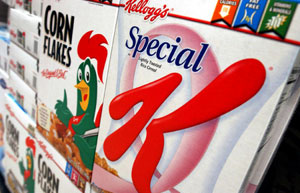 About 700 new chemicals are introduced every year, and very few are tested for toxicity. After the recall of 28 million boxes of Kellogg’s cereal, one can’t help but wonder how many of these chemicals are ending up in our food.
About 700 new chemicals are introduced every year, and very few are tested for toxicity. After the recall of 28 million boxes of Kellogg’s cereal, one can’t help but wonder how many of these chemicals are ending up in our food.
The cereal recall was due to the hydrocarbon methylnaphthalene, or 2-methylnaphthalene, reported the New York Times in July. The company claimed that the chemical was found in the packaging, not in the food, but caused the cereal to have “off-flavor and smell.” The Washington Post today reported that Kellogg’s experts determined there was “no harmful material” in the products, but some consumers have reported nausea and diarrhea. Neither the Food and Drug Administration nor the Environmental Protection Agency has safety data on 2-methylnaphthalene.
“There are potentially many thousands of chemicals that could leach out of these materials into our food,” said Jane Houlihan, the vice president of Environmental Working Group. The gap in knowledge about the chemicals used in processed foods and their packaging widens every year as chemical companies develop new synthetic materials. Under current laws, the government has little or no information about the health risks posed by most of the 80,000 chemicals on the U.S. market today. To avoid the massive costs of testing every new chemical, government regulators ask companies to volunteer information about the consumer safety of new compounds. They then determine if additional testing is needed. However, there is no law that mandates that new chemicals must be tested for safety.
The proliferation of untested chemicals had lead to a push for new food safety policies. There are bills pending in congress to strengthen both food safety laws and chemical testing laws. But these laws may take a long time to impact foods on the market. Consumers who want to protect themselves are better off purchasing foods with as few chemical additives as possible, and looking for products with minimal packaging.
Also Read:
FDA Urges New Food and Beverage Labels
